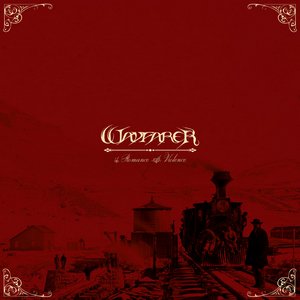As the Navy saw fit to keep me in California for four years, I had multiple opportunities to drive across the whole of the American southwest. After reading about it extensively in undergrad for any number of courses, I found that no amount of writing could do justice to the place itself. The sheer scale of the Mojave, of Arizona, or of the Rockies, each leave words wholly inadequate. Human experiences within that vastness have similarly begat an expansive range of experiences, and further the reader moves from the present, often the more violent those experiences are. The dispossession of land, geographic domination, and existential despair as whole worlds came to an end are prevalent across the historical American West.
A Romance with Violence taps into the essence of that past more directly than did World’s Blood. Enormous vistas of sound are built and punctuated with violent bursts of blackened expression. Much like last year’s Elegy by Dead To A Dying World, Wayfarer works with the cultural material of the historical American West much like Cormac McCarthy did in Blood Meridian (or even, to an extent, in No Country For Old Men) – violence is not glorified for the viewer looking back, yet it very much seems the case for the individuals involved in the historical moment. A romance, indeed.
Recorded earlier this year under the auspices of COVID and the practice of in-studio social distancing (and mask wearing!), A Romance with Violence is no mere refinement of World’s Blood, though it certainly shares much in common with it. “The Curtain Pulls Back” is the arbitrary, distorted piano introduction that sets the stage for the colossal, two part “Gallows Frontier”. A driving foray through the open world of shifting dynamics defines “The Crimson Rider” just as “The Iron Horse” is more traditional (if anxious) tear through the blackened night.
Clean vocals make a return with “Fire & Gold”, no mere introductory piece, nevertheless serves as a fantastic palate cleanser between the longer song. A Romance with Violence, while expansive on its own terms, is much more driven. The juxtaposition with the band’s historical tendency to “roam” with the narrative focus here maintains an effective tension throughout the album. Closer “Vaudeville” sees that tension spill out while also likely being the most forward-looking compositionally. Clean vocals, buried as they may be, anchor the song’s midsection before the band sets off under an epic, melancholy curtain call.
A Romance with Violence is not the experience I expected. In truth, I’m not sure what I expected, given I was a major fan of World’s Blood and the band looked to further develop the themes and concepts explored in that release. The album sounds huge and it is a complex mélange of sonic flavors. Perhaps much like the historical and literary Old West upon which it is based, there is ample space for contemplation alongside the pervasive violence, leaning into atmospherics without indulgent navel gazing. A Romance with Violence is the difficult, rewarding content I signed up for.


